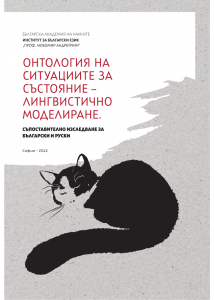Семантические типы инфинитивных конструкций русских предикативов
Semantic types of infinitive constructions of Russian predicatives
Author(s): Galina Ivanovna Kustova
Subject(s): Language studies, Language and Literature Studies, Applied Linguistics, Morphology, Syntax, Lexis, Semantics, Cognitive linguistics, Descriptive linguistics, Eastern Slavic Languages
Published by: Институт за български език „Проф. Любомир Андрейчин“, Българска академия на науките
Keywords: state predicates; predicatives; infinitive constructions; experiential states; experiencer; stimulus; emotion; interpretation
Summary/Abstract: In addition to the valency of the experiencer, e.g. (Мне холодно / страшно / стыдно (I’m cold / I’m afraid / I’m ashamed), in Russian a predicative may have a propositional valency P (stimulus-content). The propositional valency is expressed by a dependent clause, as in Приятно, что они до сих пор меня помнят (It’s nice that they still remember me) or a dependent infinitive (, e.g. Приятно засыпать под шум дождя (It’s nice to fall asleep to the sound of rain). The possibility for combining a predicative with an infinitive depends on the semantics of the predicative. Modal predicatives can subordinate the infinitive, e.g. Необходимо закончить работу в пятницу (It is necessary to finish the work on Friday), while perceptual predicatives do not: *Мне видно читать (I can see to read). Predicatives with physiological state semantics subordinate the infinitive, which represents the situation V (the channel for the stimulus’s influence), cf. Было сладко есть 280 ягоды (It was sweet to eat berries) or the situation R (the situation describing the stimulus affecting the implementation of R), cf. Темно читать (It is dark to read). Predicatives describing emotional states can subordinate the infinitive. This construction has three subtypes: (1) the infinitive P corresponds to the valency P of the predicative (stimulus-content): Грустно покидать родной дом (It’s sad to leave home); (2) the infinitive T (transfer) represents an intermediate situation between the experiencer and the stimulus: Страшно открывать дверь (I’m afraid to open the door); (3) the infinitive V is the link between the predicative and its valency P (the channel for the stimulus’s influence; V≠ P): Грустно думать, что мы больше никогда не увидимся ≈ Грустно, что мы больше никогда не увидимся (It’s sad to think that we will never see each other again ≈ It’s sad that we will never see each other again). Predicatives with the semantics of interpretation subordinate the infinitive P (with the semantic restriction that P must be an action (a controlled situation) for which a person is responsible): Неприлично подслушивать чужие разговоры (It’s indecent to eavesdrop on other people’s conversations) (the interpretative semantics is often represented by an adjective, cf. неэтичный (unethical), неприличный (indecent), неуместный (inappropriate), and by same-root adverbs; as same-root verbs do not exist, the corresponding predicatives are used). During the second half of the 20th century and the beginning of the 21st century, the number of interpretative predicatives found in this construction has been on the increase.
- Page Range: 247-280
- Page Count: 34
- Publication Year: 2022
- Language: Russian
- Content File-PDF

